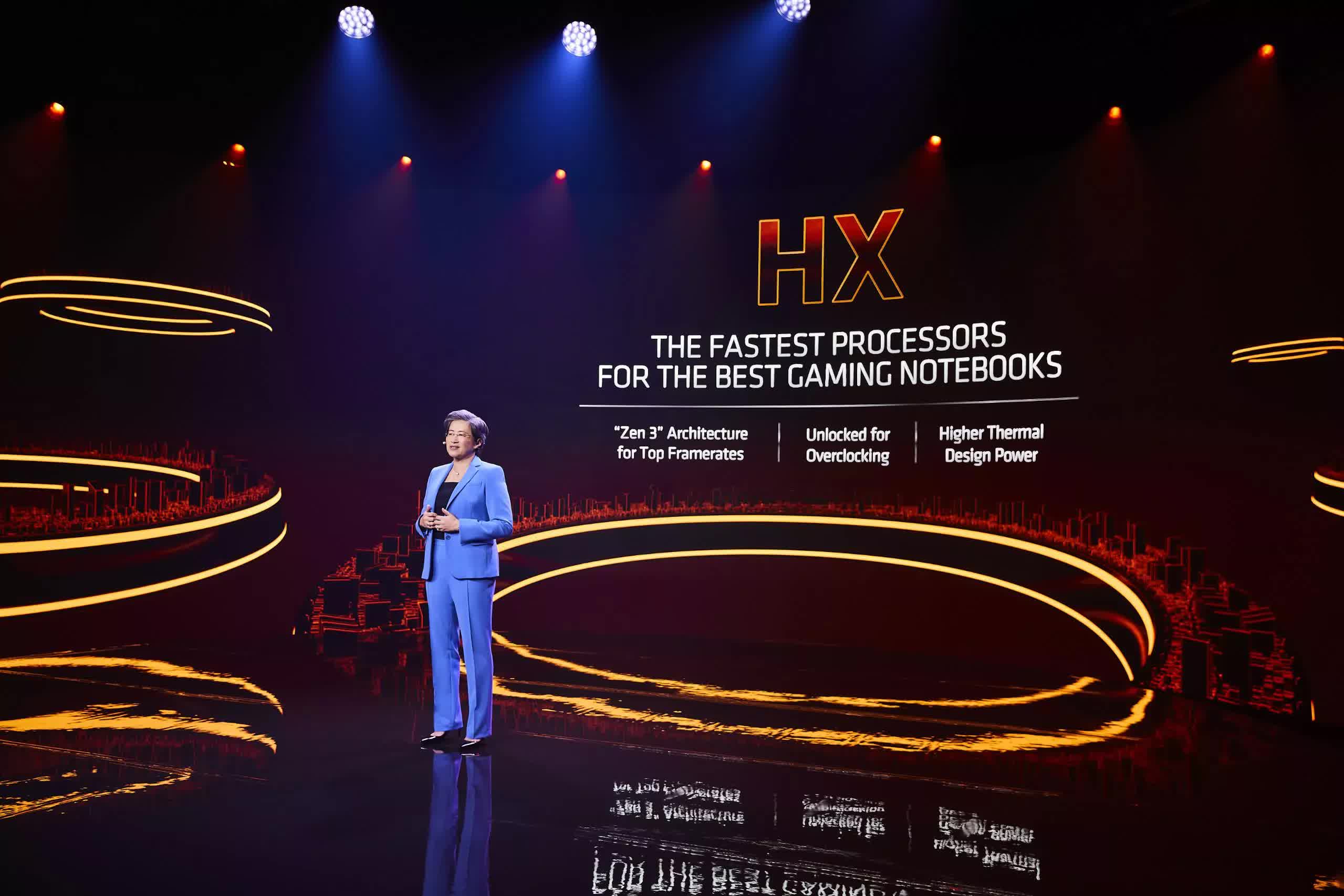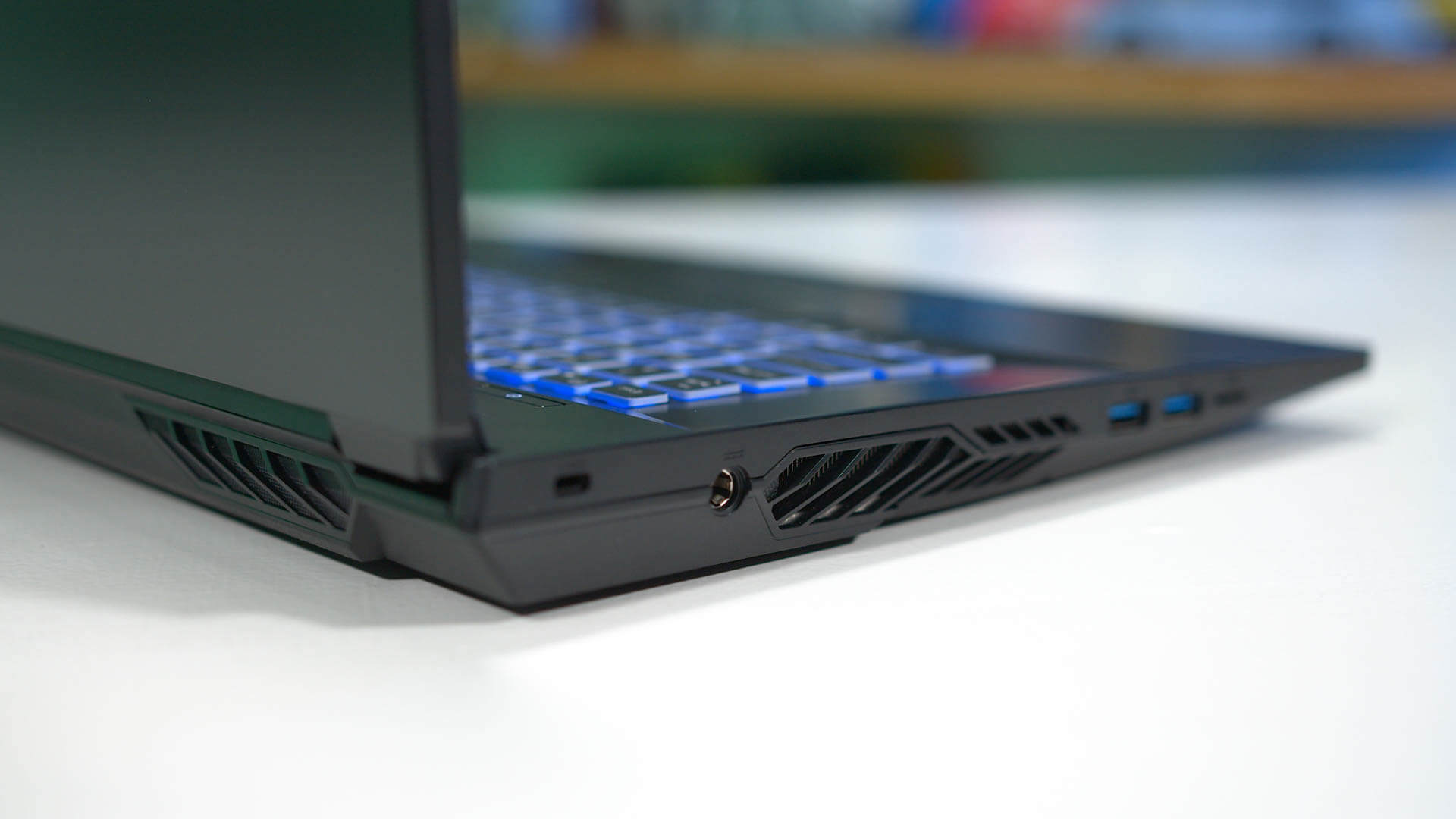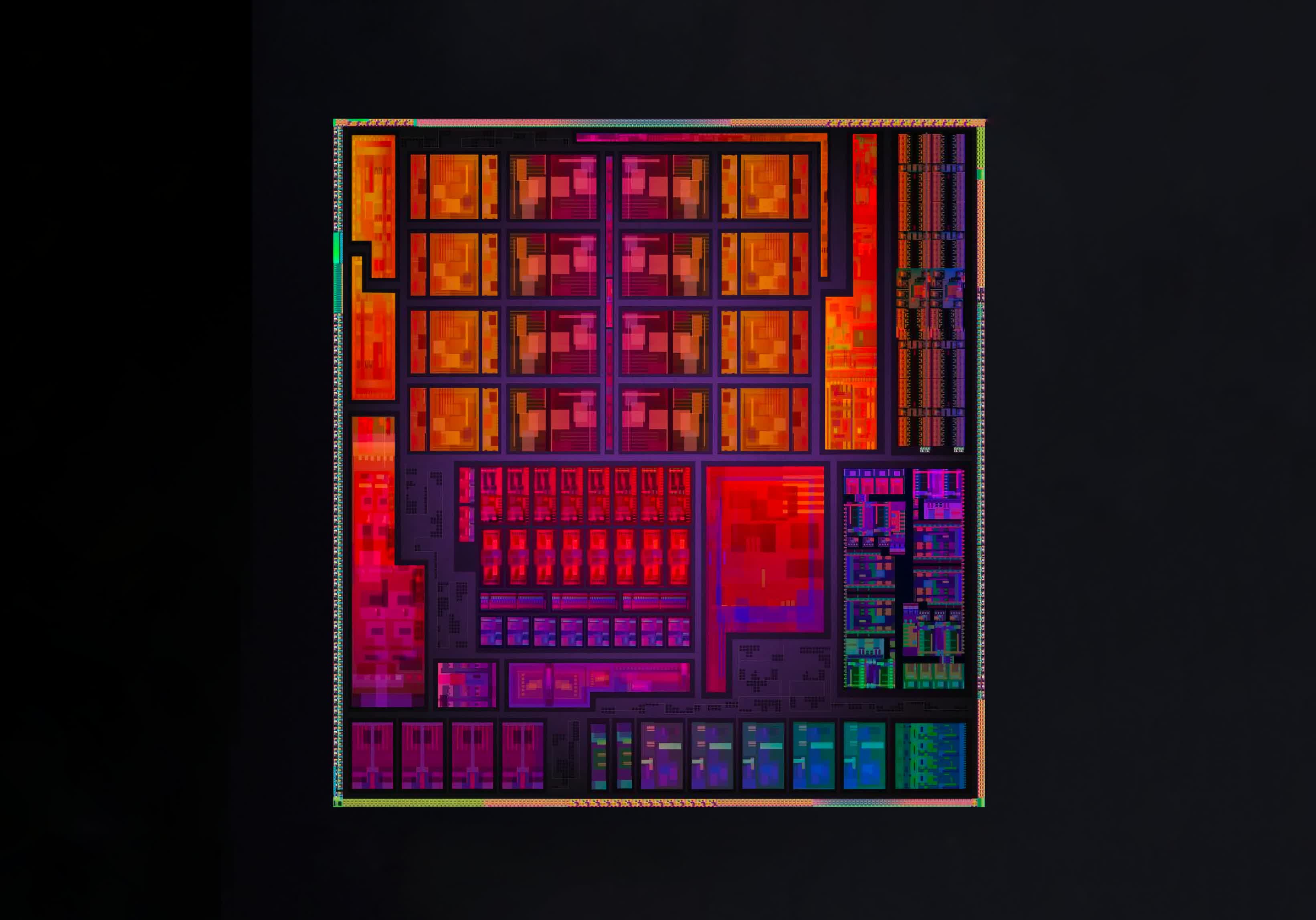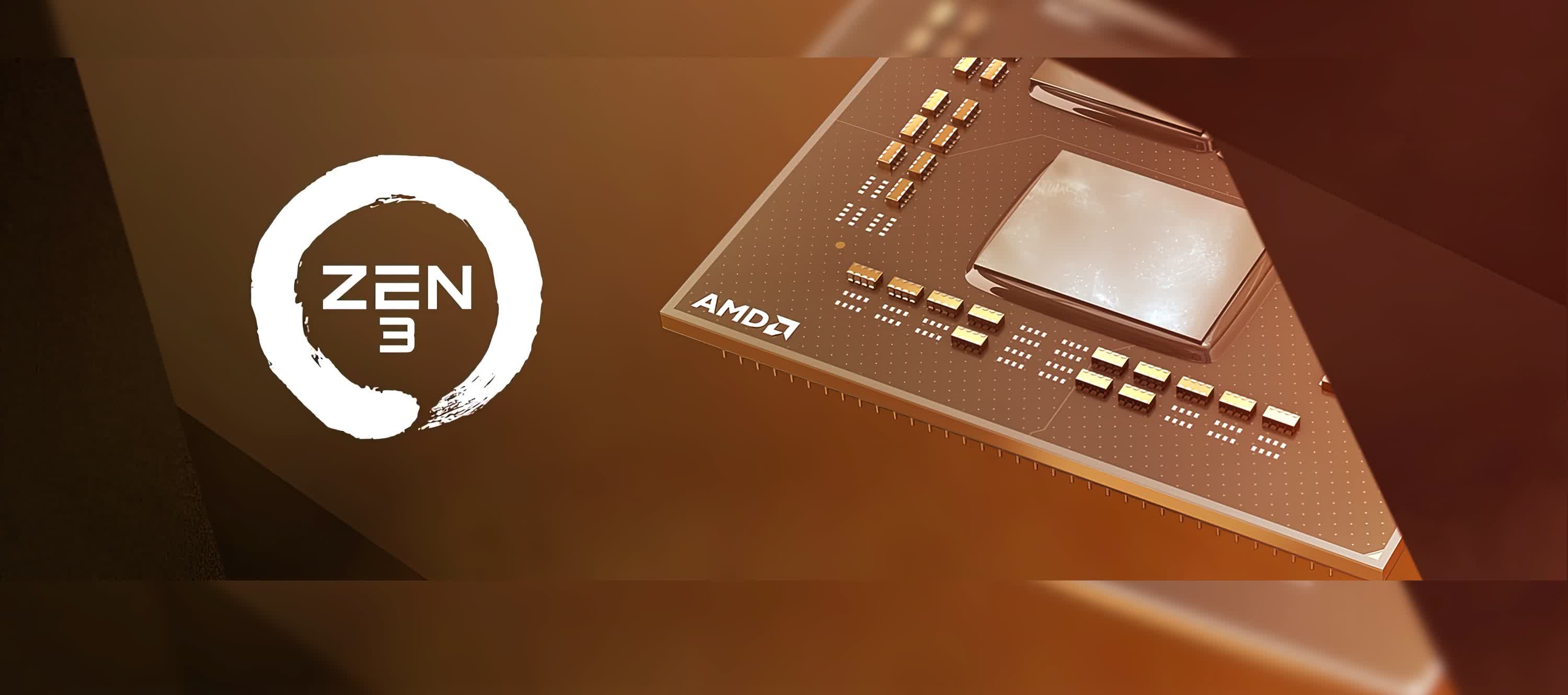The new Ryzen 9 5900HX is bound to be widely used across high-end gaming laptops. While not the outright fastest processor in the lineup – that award goes to the top-binned Ryzen 9 5980HX – the 5900HX should be a better performer than the other Zen 3 APUs we've reviewed so far, namely the 5800H and 5980HS.
The R9 5900HX has a similar layout to other Ryzen 7 and Ryzen 9 APUs this generation: we're getting 8 CPU cores and 16 threads, 16MB of L3 cache, plus 8 Vega GPU compute units unlocked, all within a 45W default TDP. The 5900HX features upgraded Zen 3 CPU cores, which means a single-CCX design, double the L3 cache and higher IPC, among other improvements.

Where the 5900HX differs compared to the 5800H is purely in clock speed: the base clock is increased by 100 MHz, indicating we should get slightly better sustained all-core frequencies at the same power level; while the boost clock has risen from 4.4 to 4.6 GHz. The GPU can now top out at 2.1 GHz as well, versus 2.0 GHz with the less expensive parts.
AMD also allows overclocking with this CPU, hence the "HX" designation although it will be up to laptop makers to expose this functionality through their own utilities.

The test system we're using for benchmarking the R9 5900HX is the XMG Apex 17, an upcoming gaming laptop based on a Clevo chassis that's almost identical to the Apex 17 we used previously to test both the Ryzen 7 5800H and RTX 3060 laptop GPU, making this a higher-end configuration of the same system.
While the laptop is much the same on the outside, and the overall chassis, in addition to the 5900HX we have 16GB of dual-channel DDR4-3200 memory, a 1080p 240Hz display, but most importantly a GeForce RTX 3070 laptop GPU running at 115W, a GPU we'll be testing soon in a variety of games.

For testing, we're running the Ryzen 9 5900HX power normalized, which allows us to compare this CPU to others found in totally different laptops in the most fair way we can currently achieve. This means the 5900HX is set to its default 45W long term power limit. Similarly, boost behaviour is unmodified, as is the case with all systems tested.
In this system we see a sustained 54W boost period for several minutes – that's typical of most Ryzen laptops we've reviewed so far. XMG also allows you to uncap the laptop to run at 54W indefinitely, if you so choose. Anyway, on to the benchmarks...
Benchmarks
In Cinebench R20's multithreaded test, the Ryzen 9 5900HX is currently the fastest mobile processor that we've tested at 45W. With a score of nearly 5000 points, this CPU is six percent faster than the Ryzen 7 5800H, and 15 percent ahead of the 4800H. What this allows Ryzen to do, is extend its lead over Intel's current best H-series processor, the Core i9-10980HK, to the point where we are now seeing a 40 percent performance advantage to AMD.

Even when we power uncap these processors, the Ryzen 9 5900HX at 45W is still the fastest chip we've tested, sitting neck and neck with the Ryzen 9 5980HS also at 45W which makes sense as they're very similar. The best score we've achieved from an Intel processor is either the Core i7-10875H running at 110W, or the Core i9-10980HK at 75W, both of which score in the 4000 points range.

In Cinebench R20's single threaded test, the Ryzen 9 5900HX surprisingly scales roughly in line with the multi-thread numbers. The CPU is 5 percent faster than the 5800H here, and it just so happens the boost clock is 5 percent higher.
We end up with 15 percent better performance here than the Core i9-10980HK, but roughly the same performance as Intel's Core i7-1185G7 which uses Tiger Lake cores.

In Handbrake the Ryzen 9 5900HX does appear to be better binned, sustaining a marginally higher clock speed at 45W for a small performance improvement versus the 5800H. It's 7 percent faster in this test, achieving a 15 percent performance lead on the 4800H and 36% versus the 10980HK.

Blender performance is nothing to get excited about. The Ryzen 9 5900HX delivers just 4% better performance than the 5800H, which itself is only slightly ahead of the 4800H. The margins compared to Intel are very similar to what we've seen previously but upgrading from Zen 2 to Zen 3 for this workload isn't worth it in most cases.


Code compilation does benefit from the 5900HX's faster boost clocks, as sections of the compile are single threaded. Here the Ryzen 9 part is 6 percent faster than the Ryzen 7 5800H, though that margin is reduced to 4 percent in the longer Chromium compilation.

The Ryzen 9 5900HX is the fastest laptop processor we've tested so far for MATLAB, with this benchmark benefitting significantly from the changes made to the Zen 3 architecture. Higher IPC, higher boost clocks and more cache all help to deliver more than a 20 percent performance boost versus the 4800H. This makes the 5900HX 16 percent faster than the Core i9-10980HK.

Our Microsoft Excel benchmark is heavy on the processor's cache. Here the 5900HX and 10980HK deliver effectively the same performance, with the 5900HX barely ahead of the 5800H. However the gains versus Zen 2 processors are more significant.

In PCMark 10's Essentials test, which measures basic application performance, the 5900HX delivers a good result at the top of the charts. This CPU is only a few percent faster than the 5800H, so practically negligible, however we do see 8 percent better performance than the 10980HK. Overall though, most high-end H-series laptops deliver very similar basic app performance and things like faster app loading is probably not a strong reason to buy a new H-series device.

The best result we saw for the Ryzen 9 5900HX versus the 5800H was in PCMark 10's applications test, which measures Office and Edge web browsing performance. The 5900HX is 10 percent faster, giving it around an eight percent lead on Intel's best processor here, the Core i7-1185G7. Thanks to better IPC and higher frequencies, Zen 3 is much better for Office applications than past Ryzen designs, as these workloads are lightly threaded.


In 7-Zip compression, the 5900HX and 5800H deliver the same performance. The Ryzen 9 part is slightly ahead of the 5800H in decompression but not to any groundbreaking degree, and this merely extends Ryzen's lead on Intel processors for decompression workloads.

In Acrobat PDF exporting, a heavily single-threaded test, the Ryzen 9 5900HX is slightly faster than the 5800H, and around 9% ahead of the Core i9-10980HK. Intel's Core i7-1185G7 running at 28W remains the fastest CPU in our charts for this test, thanks to Tiger Lake clocking up to 4.8 GHz.

Adobe Photoshop performance scales closely to single-thread performance, so there is an advantage to getting the 5900HX over the 5800H for this application, although the 5980HS with its higher boost clock is better again. The margins between Ryzen 5000 processors are small, while it's really in a Zen 2 comparison where the 5900HX shines, as it's 23 percent faster than the 4800H.

We also have Adobe Premiere's Warp Stabilizer effect, running a single instance which tends to occupy two threads at most. The 5900HX is a great choice for this workload, but it's barely any faster than the 5800H. When compared to the 10980HK however, there's a sizable 28 percent performance advantage.

Ryzen 9 5900HX + RTX 3070 Benchmarks
Next up we have some accelerated workloads showing how the 5900HX fares in tandem with a discrete GPU. However there aren't many comparisons to be made here as our 5900HX system is running alongside a new powerful RTX 3070 GPU and we haven't tested any other laptops with that GPU inside yet. It does show what sort of performance you can expect from a current-gen high-end gaming laptop.

In DaVinci Resolve, the 5900HX plus RTX 3070 combination is the best that we've tested so far, beating last-gen 10980HK plus RTX 2080 Super combinations. This new laptop config is actually quite a lot faster in this GPU heavy workload, 14% better than the next best option and nearly 30% faster than your classic Max-Q style laptop.


The 5900HX + RTX 3070 also delivers class leading results in Puget's Adobe Premiere export test, scoring above the best 10980HK configurations we've tested so far. However without accelerated encoding, using a 2-pass configuration instead for superior encode quality, we fall back to CPU performance and the 5900HX shows itself to only be slightly faster than the 5800H, which is what we've seen across many benchmarks so far.

And finally we have hardware accelerated Handbrake encoding, transcoding 4K H.264 into H.265 files. In terms of AMD VCE performance, the built in media encode/decode block in Ryzen 5000 APUs, there has been no performance improvement versus the previous generation - which makes sense, as AMD says this area of the chip is the same as previous generations.
Generally speaking, in this test AMD's VCE is as fast at transcoding as Nvidia's NVENC in RTX 20 and 30 series GPUs, only beaten strangely enough by the GTX 1650 Ti equipped systems we've tested. Intel's QuickSync found in 10th-gen parts is much slower in this workload.
We should note that this benchmark uses a high enough bitrate for the output file that the quality is virtually identical between all encoding engine choices. This benchmark does not take into account which encoder delivers better quality at lower bitrates, which is often a use case for hardware encoding, so you'll have to check other sources to find out what is best - last we checked NVENC is the best but that may have changed. This workload is purely measuring encoding speed.
For this review we decided to skip testing of integrated graphics because the results are basically the same as what we looked at in our Ryzen 7 5800H review. We'd also expect most 5900HX systems to feature a discrete GPU, making the results not that valuable for most laptop buyers.
Comparisons
Comparing the Ryzen 9 5900HX to the Ryzen 7 5800H shows that the 5900HX is only a few percent faster, whether we're talking about single or multi-threaded applications. On average, the 5900HX is 4% faster across our benchmark suite, which is as close as you can get for two different models with a small difference in clock speeds.

The 5900HX does appear to be better binned, allowing it to hit higher boost frequencies and better sustained frequencies at 45W, but given the two parts are both 8 cores with 16 threads, that's really all there is to it in terms of differences.

The Ryzen 9 5900HX is quite a bit faster than the Ryzen 7 4800H though granted, these APUs are not in the same class within their generations. When comparing the 5800H to 4800H previously, the multi-thread gains were modest, but with the 5900HX pulling away some more, it helps extend the lead on the 4800H. If you are upgrading across just one generation like this, you can expect 15 percent better multi-thread performance and 20 to 25 percent better single-thread performance which is great.

The Ryzen 9 5900HX is almost always faster than the Core i9-10980HK. The big strength for the 5900HX is multi-thread performance, where the efficiency of the 7nm node allows the Ryzen processor to pull well ahead of Intel's aging 14nm process. Single thread is closer, but generally the new Zen 3 design clocked up to 4.6 GHz is able to edge out a small win.

Ignoring multi-threading performance for a second which perhaps isn't as relevant for ultrabook-class CPUs, the Ryzen 9 5900HX delivers similar performance to Intel's Core i7-1185G7 in single-thread apps. The 1185G7 uses Intel's Tiger Lake cores on their 10nm SuperFin process, and there's not much separating these parts core-for-core. When Intel is able to deliver 8-core Tiger Lake mobile processors in a few months, the battle will be quite interesting.
What We Learned
To sum up what the Ryzen 9 5900HX offers, there's two ways to look at it: this mobile processor is the fastest that we've seen yet, delivering excellent performance across the board. On the other hand, the 5900HX isn't that much faster than the Ryzen 7 5800H, so depending on the laptop configuration, it may not be the best choice.
Focusing on the positives first, the 5900HX delivers everything we've talked about in previous Ryzen Mobile 5000 reviews: chart topping performance and improved single-thread performance and IPC thanks to Zen 3. This allows the 5900HX to beat Intel's Core i9-10980HK in the vast majority of applications, especially when those apps make heavy use of multi-threading, while trading blows with Intel's newer Tiger Lake designs in single-threaded tests. Both single and multi-threading are a strength of the 5900HX, so it's a great all-round mobile processor that should be up to any task you throw at it.

In perspective, however, the Ryzen 9 5900HX is barely faster than the Ryzen 7 5800H on average, as both chips are fundamentally very similar. So in terms of value, it's our opinion that it's not worth paying much of a premium to get a 5900HX laptop over something with the 5800H inside, unless the 5900HX system comes with additional benefits like a faster GPU, for example. The 5800H provides most of the performance that you get with the 5900HX.
This information we suspect will be most useful for people buying, say, an RTX 3070 laptop with a choice between a 5800H laptop from brand A, and 5900HX from brand B. Other factors such as brand, build quality and display will probably be more important than CPU performance between these two models.
As we also discussed in our review of the Ryzen 7 5800H, if you're looking for a performance laptop, at this point we would skip Intel 10th-gen models. The performance just isn't there relative to Ryzen, so unless an Intel machine was a decent amount cheaper, we don't think it would be worth buying. If you're interested in Intel laptops and want to get a better scope of the competition, it could be worth waiting a couple of months until 11th-gen Tiger Lake gaming systems with 8 cores are ready for prime time.
